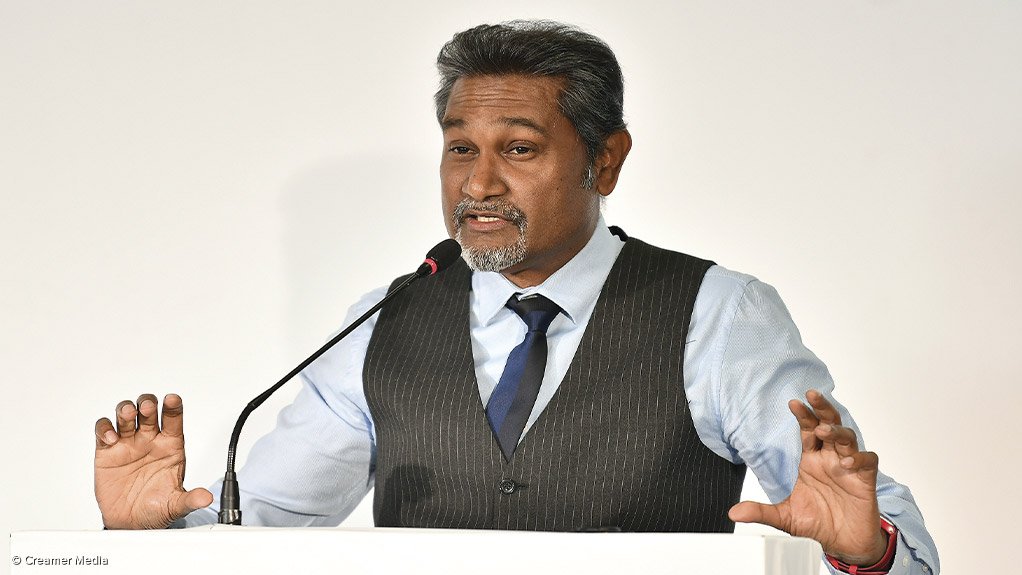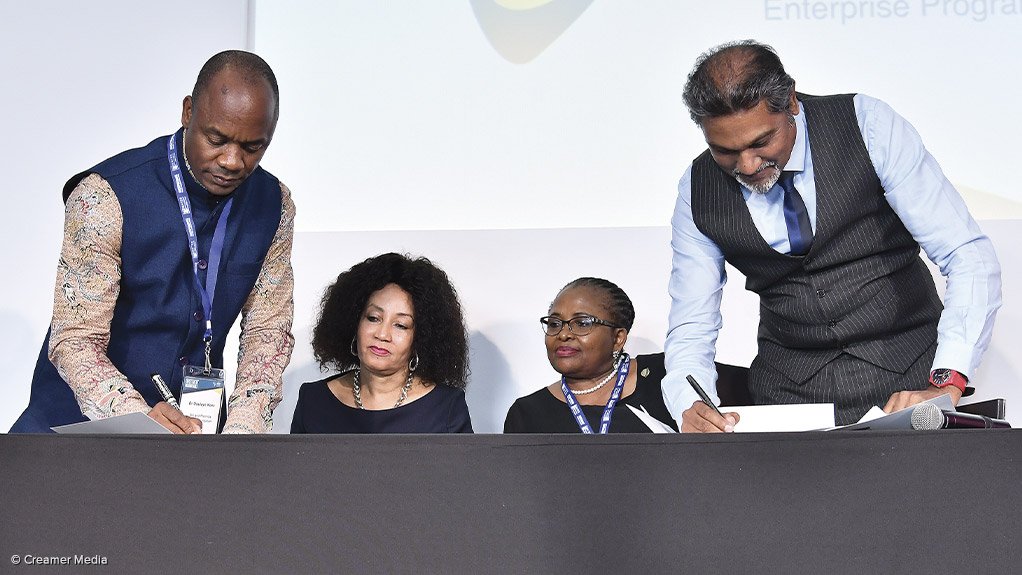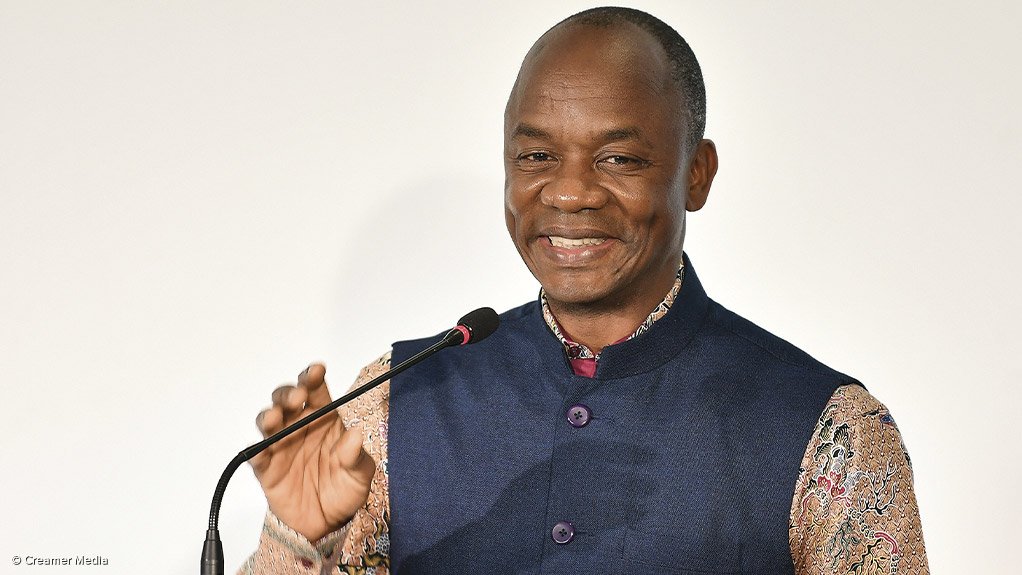South Africa is on the verge of a sanitation revolution
South Africa is sitting on the edge of a revolutionary opportunity that could position it as the nucleus of a new multibillion-dollar circular economy and subsequently reduce inequality, provide dignified sanitation solutions to all, create more businesses and jobs and boost the economy.
The new sanitation economy not only presents vast potential to address one of the most urgent challenges of our time: achieving universal access to improved safely-managed sanitation by 2030, but also enable global economic growth through the development of an entirely new value chain.
The Water Research Commission (WRC), along with its local and international partners, including the Bill and Melinda Gates Foundation (BMGF), have been developing a suite of cutting-edge, off-grid innovative technologies and solutions that has the potential to revolutionise sanitation.
Showcased at the recent African Sanitation Revolution Investment Roundtable, held in Sandton, Gauteng, the new ready-for-market sanitation innovations reveal the potential of Africa, as a continent, to leapfrog into the revolution in a manner similar to the unprecedented development of the mobile telecommunications industry.
Africa can pioneer global sustainable development owing to its current low industrialisation levels with respect to the basic needs of water, sanitation, energy, health and nutritional security.
This is compared with developed economies, which will have to invest in high-cost retrofitting to switch from the current high-carbon, water-intensive and waste-producing economic models.
“Africa’s delayed stage of development actually becomes an advantage, as it can leapfrog to the latest technology and become a significant part of the economic growth of the continent and the entire developing world,” says BMGF water, sanitation and hygiene programme deputy director Dr Doulaye Koné.
Further, potential exists for South Africa to be a front runner as a manufacturing, technology development and innovation hub in the area of new sanitation technology for the developing world.
A New Ecosystem
“We are on the cusp of a sanitation revolution. It is no longer a question of if we can . . . bring sanitation solutions online. It is a question of how quickly this new category of off-grid solutions will scale,” Koné highlights.
Catapulting the sanitation revolution is the launch of the second phase of the South African Sanitation Technology Evaluation Programme (SASTEP) at the roundtable event to unlock the development of a platform aimed at promoting and fostering the commercialisation and industrialisation of next generation sanitation products and technologies, including the water-smart reinvented toilets, in South Africa.
There is a need to create the right ecosystem to drive the global momentum and attract the investment and interventions required to transition the country towards the circular economy with a new sunrise industry and a starting base for a genuine green economy, says WRC CEO Dhesigen Naidoo.
Equipped with a game-changing R75-million grant from the BMGF, the work undertaken by the WRC and its partners can transition from a laboratory research space into the field at the scale needed to launch the revolution.
“We understand that, for any technology to be in the market, someone has to do the initial investment to develop it, and with a R75-million grant to the WRC, South Africa is going to be a platform where the business and market opportunity for this technology is validated,” says Koné.
“The problems we seek to solve are very complex. They require coordination from many leaders of government, communities and individuals. We build partnerships, like the one we are launching to today,” he continues.
SASTEP is also supported by the Department of Science and Innovation (DSI), the South African Local Government, the Office of The Presidency through the Sanitation Appropriate for Education (SAFE) Programme, and the Department of Human Settlements, Water and Sanitation (DHSWS), with the WRC providing strategic technical and sector support.
The initiative will facilitate discussions between local commercial partners with municipalities interested in being testbed partners for the demonstration of the technologies, as well as match South African companies and investors to a global portfolio of off-grid sanitation technologies to develop, pilot, localise and bring to market for local communities, schools and rural and peri-urban households.
In addition to inbound technologies, the programme will also empower, showcase and promote local sanitation innovators. It expected that the diffusion of both local and inbound technologies will benefit the end-user and create solutions that are relevant in the local context.
SASTEP’s reinvented toilet initiative will be developed and implemented in partnership with public sector leaders, including the Department of Trade, Industry and Competition (DTIC), public investment teams in the Industrial Development Corporation, the Development Bank of South Africa and the Public Investment Corporation, as well as academic partners at the University of KwaZulu-Natal, testbed partners such as the City of eThekwini, the Department of Basic Education (DBE) and private sector supply chain and investment partners.
The initiative will partner with the SAFE initiative as an early adopter platform, with nearly 4 000 schools identified by the DBE as requiring new sanitation facilities to address the shortfall and inadequacy of facilities.
Innovative, non-sewered sanitation solutions, like the reinvented toilet, show promise as a way to transform the quality and prevalence of safe, dignified sanitation for children in schools, informal settlements and other communities where safe sanitation is scarce.
This will demonstrate the potential of the reinvented toilet as a sustainable solution to national sanitation challenges.
Reinvented toilet technologies use internal treatment systems to process human waste and kill the pathogens that make people sick, meeting global safety and performance requirements – all without connections to sewers or water supply.
SASTEP will also strengthen the manufacturing and service delivery base required to support the development and scaling of the reinvented toilet in South Africa.
The initiative aims to increase competitiveness of South African companies, boost its economy and create much needed jobs, while dealing with sanitation complexities and backlogs faced by the State daily.
Through innovation and smart chain supply, universal access can be achieved sustainably and linked to water security and business opportunities.
“New revolutionary sanitation is not only our best chance to fully meet the Sustainable Development Goals (SDGs) of universal access to safe and improved sanitation, but it is also a great opportunity to develop sunrise industries and stimulate a new category of industrialisation and a new generation of entrepreneurs,” Naidoo points out.
The lessons learnt on this platform will be translated into a pan-African offering for further engagement and dissemination.
“The expansion of non-sewered sanitation solutions . . . could dramatically reduce the human and economic toll of unsafe sanitation in South Africa, by making existing sanitation systems safer, and building new, sustainable approaches that protect people from disease for generations to come,” Koné adds, noting that sanitation is one of the world’s oldest and most destructive challenges, and solving it has huge potential to improve the health and the future of billions of people.
Unsafe sanitation places a significant economic burden on countries that can least afford it, with estimates that it costs the global economy about $223-billion a year in the form of higher health costs and lost productivity and wages.
In 2017, there were 2.8-million households in South Africa that used unimproved sanitation, including 280 791 households which practised open defecation.
The medium-term view is to build an industrial platform that attracts private sector investment and disrupts the current technology trajectory of the sanitation industry through affordable innovative technologies and social entrepreneurship models.
The utility service and business models need to be reinvented to exploit the multiplier effect the new sanitation would bring amid a cycle of technology design, water treatment, water distribution, water use and consumption, wastewater collection, recycling and water reclamation, and product recovery and residual waste use, in addition to beneficiation.
“It is exciting that solving the problem of unsafe sanitation will also create a new multibillion-dollar business opportunity.”
In fact, this is the biggest opportunity in a century to transform sanitation systems into a smart, sustainable and revenue generating economy, thereby creating a robust marketplace of new opportunities that have been virtually untapped.
With the new advances in technology, a market opportunity to meet the needs of 4.5-billion people worldwide emerges.
It is deemed rare for a new industry with instant access to more than one-billion customers to emerge, which means South Africa has an opportunity to develop a hive of “sanicorns”, or sanitation unicorns: start-ups that reach a golden mark of turnover of $1-billion a year.
As resources become increasingly constrained for business and society, toilet resources and revaluing human waste, is one of the only resources that grows as the population grows.
The economic case for the sanitation economy is clear and evidence of existing business models, demand and momentum is building.
“If we manage to achieve this, we will be introducing a model for low-cost, high-beneficiation, low-water, low-energy and, of course, concomitantly low-carbon sanitation,” says Naidoo.
The sanitation economy is now the business opportunity of the decade, by monetising toilet provision, products and services, biological resources, data and information to provide benefits across the economy and society.
The interest is clear as the roundtable attracted a host of stakeholders, from banking firms to innovators, to share and shift gear in our efforts towards the development of an innovative sanitation technology platform in South Africa, revealing the heightened and ever-increasing interest in what was once considered an lacklustre industry often overlooked.
“We managed to get the policymakers, scientists, business, investors and user groups to become part of one conversation of creating this new sanitation. We joined technology providers, commercial partners, investors and municipalities to discuss partnership opportunities that will result in the commercialisation and localisation of off-grid next generation sanitation technologies in South Africa during the event’s successful Innovation Café,” Naidoo notes.
There is a case for non-sewered sanitation with a local South African market opportunity of R17-billion annually to meet the SDG targets while the opportunity is significantly greater globally.
For very $1 investment in sanitation, it is expected that there will be positive returns of about $5.50 through savings from lower healthcare costs, improved productivity, increased attendance at schools and fewer premature deaths.
The Toilet Board Coalition (TBC) estimates the sanitation economy at $62-billion market annually in India alone by 2021, double that of the current $31-billion sanitation economy.
The work of the TBC and its members has found that, on average, per one-million people served, countries can gain $70-million in increased productivity through the provision of safe sanitation.
Further, lower capital and operating costs, together with revenues from toilet services and resource recovery, can reduce the cost of sanitation per person to around $6, compared with traditional norms of $100 to $200.
This means financial savings in construction costs, as the kilometres of sewerage pipelines, as well as large wastewater treatment plants, are no longer needed.
“It is envisaged that the diffusion of new and innovative non-sewered sanitation systems will transform school, rural, peri-urban and possibly informal settlements sanitation solutions, reduce the current high cost per toilet seat, increase health and safety, and provide the next generation of learners and communities with hygienic and dignified sanitation solutions,” says Human Settlements, Water and Sanitation Minister Lindiwe Sisulu.
SASTEP, responding directly to DTI’s Industrial Policy Action Plan, will create the impetus to grow a new sanitation circular economy based on resource recovery and a service industry for operation and maintenance through the use of innovative products which result in smart supply chains.
The South African Bureau of Standards has also adopted the ISO 30500 Standards on non-sewered sanitation as a national standard in May 2019 – a huge milestone for South Africa, which was the second country to adopt this standard.
The DHSWS is formulating new regulations to ensure the National Building Regulations include the new off grid sanitation solutions.
“It is important that all stakeholders, from government to the private sector and society, buy into the sanitation revolution. It is a revolution we need to win to achieve a radical transformation in the sanitation sector,” she says.
Transforming the sanitation space will result in localisation, the establishment of value chains and critical linkages with the potential future global value chains also stimulates and creates a new industry with products and services and many new jobs.
Comments
Press Office
Announcements
What's On
Subscribe to improve your user experience...
Option 1 (equivalent of R125 a month):
Receive a weekly copy of Creamer Media's Engineering News & Mining Weekly magazine
(print copy for those in South Africa and e-magazine for those outside of South Africa)
Receive daily email newsletters
Access to full search results
Access archive of magazine back copies
Access to Projects in Progress
Access to ONE Research Report of your choice in PDF format
Option 2 (equivalent of R375 a month):
All benefits from Option 1
PLUS
Access to Creamer Media's Research Channel Africa for ALL Research Reports, in PDF format, on various industrial and mining sectors
including Electricity; Water; Energy Transition; Hydrogen; Roads, Rail and Ports; Coal; Gold; Platinum; Battery Metals; etc.
Already a subscriber?
Forgotten your password?
Receive weekly copy of Creamer Media's Engineering News & Mining Weekly magazine (print copy for those in South Africa and e-magazine for those outside of South Africa)
➕
Recieve daily email newsletters
➕
Access to full search results
➕
Access archive of magazine back copies
➕
Access to Projects in Progress
➕
Access to ONE Research Report of your choice in PDF format
RESEARCH CHANNEL AFRICA
R4500 (equivalent of R375 a month)
SUBSCRIBEAll benefits from Option 1
➕
Access to Creamer Media's Research Channel Africa for ALL Research Reports on various industrial and mining sectors, in PDF format, including on:
Electricity
➕
Water
➕
Energy Transition
➕
Hydrogen
➕
Roads, Rail and Ports
➕
Coal
➕
Gold
➕
Platinum
➕
Battery Metals
➕
etc.
Receive all benefits from Option 1 or Option 2 delivered to numerous people at your company
➕
Multiple User names and Passwords for simultaneous log-ins
➕
Intranet integration access to all in your organisation

























